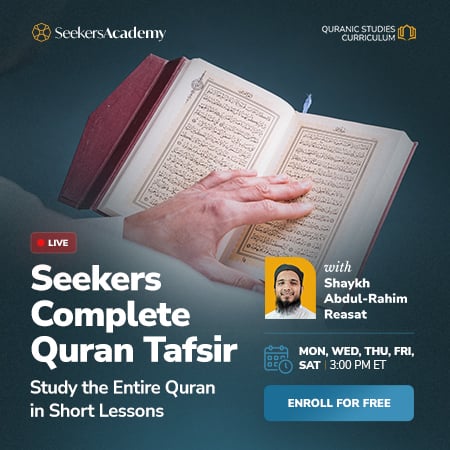
This course involves a comprehensive study of the Qur’an, its themes, messages, rhetorical features and philosophical nuances—all based upon the authoritative tafsirs of our tradition. It sufficiently equips general audiences and students of knowledge
alike with a thorough grasp and firm foundation in Qur’an studies.
Each thirty-minute class covers approximately half a page of the Qur’an, allowing students to follow along and catch up on missed lessons easily. These classes will build upon one another, demonstrating the general themes of each sura and explaining each verse in light of them.
The preservation of the rich tradition of Qur’anic understanding is of utmost importance for Muslims. By completing this course, students will take part in this significant tradition by preserving the meanings of the Qur’an within their hearts.
The Seeker’s Complete Qur’an Tafsir will be primarily based on :
‘Tafsir Abi al-Su’ud,” by Shaykh al Islam Abu al-Su’ud al ‘Imadi, and “Al-Tafsir al-Wasit,” by Shaykh al Azhar, Muhammad Sayyid Tanwati
- Teacher: Shaykh Abdul-Rahim Reasat
The Seekers Complete Qur’an Tafsir will be primarily based on a classical and a contemporary work:
• ‘‘Tafsir Abi al-Su’ud,” by Shaykh al Islam Abu al-Su’ud al ‘Imadi, the great Ottoman Judge, Mufti, and Mufassir. This work is authoritative in the science of tafsir. It was built upon the greatest tasfirs that came before it and had an undeniably strong influence on those which came after it.
• “Al-Tafsir al-Wasit,” by Shaykh al Azhar, Muhammad Sayyid Tanwati, the Grand Mufti of Egypt. This tafsir was written over ten years and is based on some of the most influential works in this science, including the tafsirs of Tabari, Qurtubi, Ibn Kathir, and Alusi. It summarises many of the nuanced and detailed discussions found in other works.
- Understand the general theme of each sura.
- Identify the main hadiths related to each sura.
- Understand the broad verse-by-verse meanings of each sura.
- Implement the virtuous acts mentioned in each sura.
- Distinguish some linguistic nuance and theological points of a few suras.
- Understand the common misconceptions of some suras
- Describe the qualities of the Messenger of Allah (Allah bless him and give Him peace) and how they relate to the Qur’an.
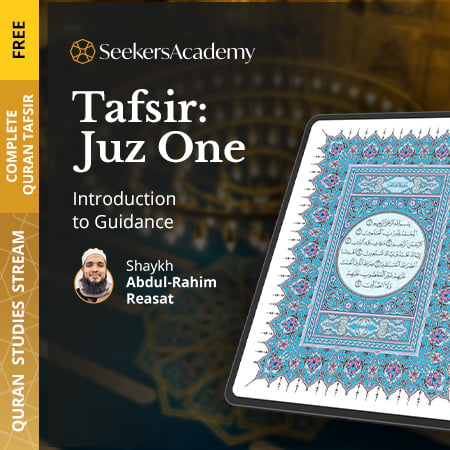
This course explains the introductory suras of the Qur’an. Sura al Fatiha teaches us how to turn to Allah, why He deserves worship, and how we do so in the way He wants. Sura al Baqara expands on the theme of guidance present in Sura al Fatiha. It teaches us how humans are in relation to their faith in God, why He deserves to be worshipped, and how people deviate from this axial purpose of their existence, Through this juz’, believers gain an understanding of the main ways in which people deviate from the truth. This is through an analysis of Banu Isra’il and their interaction with Allah and His Prophets (Allah bless them and give them peace). All of this is based on the authoritative tafsirs of Shaykh al Islam Abu al Su’ud, Shaykh Muhammad Sayyid Tantawi, and others.
- Teacher: Shaykh Abdul-Rahim Reasat
- a deep and clear explanation of the first juz’ of the Qur’anic text
- an understanding of the themes of the first two suras and how these themes relate to the verses
- an insight into linguistic nuances in the Qur’an
- an overarching view of the interconnectedness of the Qur’an’s verses.
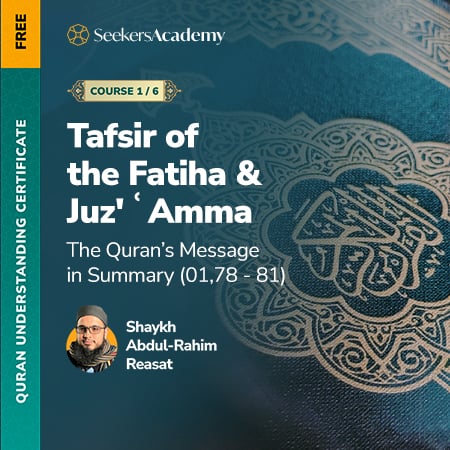
This is the first course in Qur’anic Understanding Certificate. Students are able to gain a certificate upon completion of all six courses.
It is based on the works of a number of classical and contemporary scholars. Among them, Shaykh al Islam Abu Su’ud, the Mufti of the Ottoman Empire in his time.
It is a detailed thematic and linguistic analysis of the most frequently recited sura, al Fatiha, and the initial few suras in the final 30th of the Qur'an.
Sura al Fatiha acts as an introduction to the relationship between Allah and His servants; it teaches us why we should worship Him and how this worship should be characterized and expressed. Suras al Naba’, al Nazi’at, ‘Abasa, and Takwir, all take our attention to the Day of Judgement, but from different perspectives.
- Teacher: Shaykh Abdul-Rahim Reasat
This course is based on many classical and contemporary tafsirs, such as Ruh al Ma’ani, Tafsir Abu al Su’ud, Nazm al Durar, al Tahrir wa al Tanwir, and others.
- This course is for teenagers and adults.
- It is particularly beneficial for those who have memorized these suras, and those who know some Arabic.
- This course can also be taken by anyone who is interested in learning about the meanings of the Fatiha and the other suras it covers. It is aimed at all Muslims who want to know and see the beauty of the Qur’an, its message, and its proofs.
- There are no prerequisites to this course.
- Understand the deeper meanings of the words of the Fatiha and the other covered suras.
- Understand the themes of these suras, and be able to apply them to the individual verses and their meanings.
- Apply the lessons of guidance from the suras to their lives.
- Apply the teachings to their relationships with Allah and people, to enhance them.
- Reflect on the meaning of the verses and the wisdom and proofs in them, to strengthen their faith.
- Memorize the suras much easily with understanding.
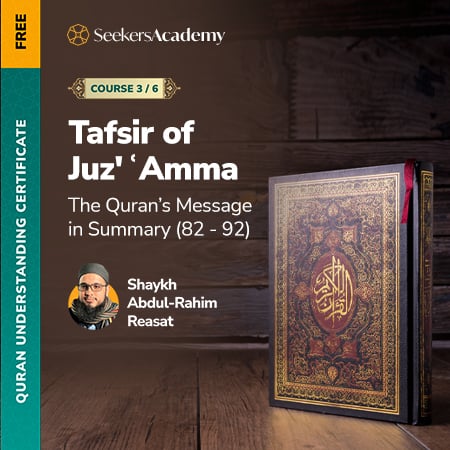
This is the third course in Qur’anic Understanding Certificate.
This course is based on the works of a number of classical and contemporary scholars. Among them, Shaykh al Islam Abu Su’ud, the Mufti of the Ottoman Empire in his time. The tafsir of the final 30th Part (Juz' 'Amma) of the Qur’an continues in this module with the analysis of the mid-length verses (suras) of this part. The verses covered are from Sura al Infitar to Sura al Layl.
In this course, we learn how the Qur’an connects the believer to the Day of Judgement from multiple perspectives. They include the recording of our deeds; comparing the situations of people in this life and the next; and the final state of persecutors and the persecuted. Other themes expanded upon are the eventual ease for the believers and the inevitable fatigue of the disbelievers; the difficulty of this life; and the great good spending on worthy causes leads to.
- Teacher: Shaykh Abdul-Rahim Reasat
This course is based on many classical and contemporary tafsirs, such as Ruh al Ma’ani, Tafsir Abu al Su’ud, Nazm al Durar, al Tahrir wa al Tanwir, and others.
- This course is for teenagers and adults.
- This course is based on many classical and contemporary tafsirs, such as Ruh al Ma’ani, Tafsir Abu al Su’ud, Nazm al Durar, al Tahrir wa al Tanwir, and others.
- This course can also be taken by anyone who is interested in learning about the meanings of the Fatiha and the other suras it covers. It is aimed at all Muslims who want to know and see the beauty of the Qur’an, its message, and its proofs.
- There are no prerequisites to this course.
- Understand the deeper meanings of the words of the suras.
- Understand the themes of these suras, and be able to apply them to the individual verses and their meanings. .
- Apply the lessons of guidance from the suras to their lives.
- Apply the teachings to their relationships with Allah and people, to enhance them.
- Reflect on the meaning of the verses and the wisdom and proofs in them, to strengthen their faith.
- Memorize the suras much easily with understanding.
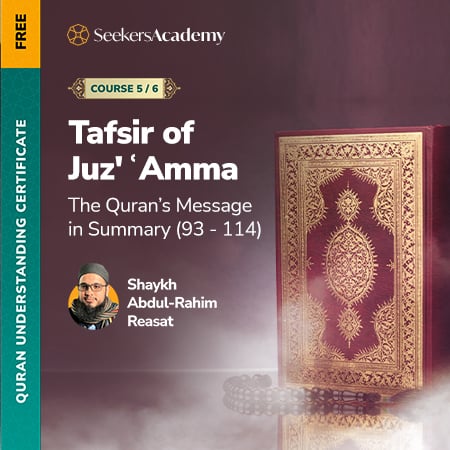
This is the fifth course in Qur’anic Understanding Certificate.
This course is based on the works of a number of classical and contemporary scholars. Among them, Shaykh al Islam Abu Su’ud, the Mufti of the Ottoman Empire in his time.
Concluding the study of the final Juz’ of the Qur’an, this module covers from Sura al Duha to Sura al Nas. Each chapter is short and each bears a powerful message. They drive the believers to engage with them through recitation, memorisation, and reflection.
This course is beneficial for all believers. The themes of the concluding chapters of the Qur’an serve to console us, to show us the wisdom of the Judgement, and to direct us to prepare for that day. Ultimately, they teach us to affirm that everything is in the hands of God, and that we need to seek His aid for protection and success.
- Teacher: Shaykh Abdul-Rahim Reasat
This course is based on many classical and contemporary tafsirs, such as Ruh al Ma’ani, Tafsir Abu al Su’ud, Nazm al Durar, al Tahrir wa al Tanwir, and others.
- This course is for teenagers and adults.
- It is particularly beneficial for those who have memorized these suras, and those who know some Arabic.
- This course can also be taken by anyone who is interested in learning about the meanings of the Fatiha and the other suras it covers. It is aimed at all Muslims who want to know and see the beauty of the Qur’an, its message, and its proofs.
- Students studying for the certificate should complete earlier courses in this stream before taking this course.
- Understand the deeper meanings of the words of the suras.
- Understand the themes of these suras, and be able to apply them to the individual verses and their meanings.
- Apply the lessons of guidance from the suras to their lives.
- Apply the teachings to their relationships with Allah and people, to enhance them.
- Reflect on the meaning of the verses and the wisdom and proofs in them, to strengthen their faith.
- Memorize the suras much easily with understanding.
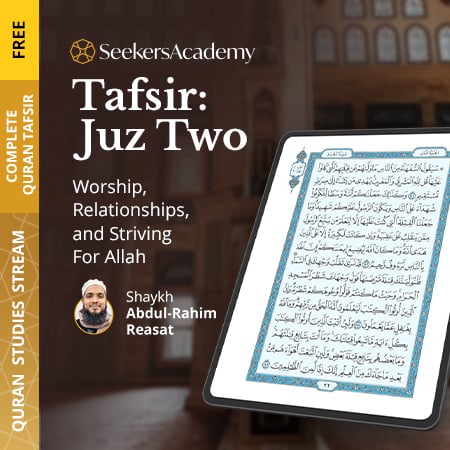
This course continues the explanation of Sura al Baqara. After exhorting the believers to not adopt the attitude of Bani Isra’il, Allah now introduces and expands many laws needed for the benefit of humanity. We are given insight into the changing of the Qibla, slaughter, not hiding God’s teachings, virtuous acts, fasting, the Hajj, and more. Of particular importance are the laws relating to the family, marriage, and divorce, which are expounded on in detail. The juz’ ends with a focus on supporting the religion of God through exerted effort - whether in a financial or a military context. Through this juz’, believers will gain a deeper appreciation of many rulings of the Shari’a. They will learn about their wisdom, how they are derived from the Qur’an and the contextual circumstances of their revelation.
- Teacher: Shaykh Abdul-Rahim Reasat
- a deep and clear explanation of the second juz’ of the Qur’anic text
- an understanding of the verses of this juz’ and how they tie into the overall theme of the sura.
- an insight into the wisdom, justice, and beauty of the Shari’a.
- an overarching view of the interconnectedness of the Qur’an’s verses.
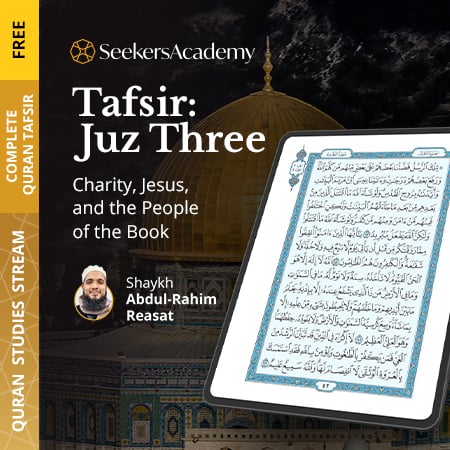
This course concludes Sura al-Baqara by encouraging believers to give charity and to spendin the way of Allah. To balance this, the harms of Riba (Interest) are made clear, lest anyone seeks a purely material increase in this life at the cost of punishment in the next. Following this, Sura Al ‘Imran begins its focus on the meanings of Tawhid (Divine Oneness) and its many facets. The false narratives about Mary and Jesus are rebutted, and some of the corrupt practices of the Banu Isra’il are laid bare.
- Teacher: Shaykh Abdul-Rahim Reasat
This tafsir is primarily based on a classical and a contemporary work.
‘‘Tafsir Abi al-Su’ud,” by Shaykh al Islam Abu al-Su’ud al ‘Imadi, the great Ottoman Judge, Mufti, and Mufassir. This work is authoritative in the science of tafsir. It was built upon the greatest tasfirs that came before it and had an undeniably strong influence on those which came after it.
“Al-Tafsir al-Wasit,” by Shaykh al Azhar, Muhammad Sayyid Tanwati, the Grand Mufti of Egypt. This tafsir was written over ten years and is based on some of the most influential works in this science, including the tafsirs of Tabari, Qurtubi, Ibn Kathir, and Alusi. It summarises many of the nuanced and detailed discussions found in other works.
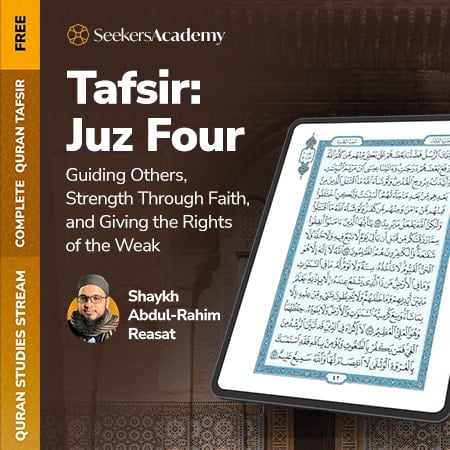
This course concludes the discussion on the latter part of Sura Al ‘Imran, where the attempts of the People of the Book to avoid submission to God are criticised. Next, the Believers are told how to benefit from their belief in Tawhid: though unity amongst themselves, service and benefit of humanity, and devotion to God. Devotion comes from certainty in Allah’s plan and guidance. Ignoring that guidance leads to failure. These lessons are highlighted through the events of the battles at Badr and Uhud, ending with a summary of what devoted servants of God are like.
Next, Sura al-Nisa (Women), also known as the Chapter of Justice, begins to redress the wrongs present in Arabian and other societies: the mistreatment of the weak. Orphans, inheritance, and who one may marry are the first matters to be addressed.
This tafsir is primarily based on a classical and a contemporary work:
‘‘Tafsir Abi al-Su’ud,” by Shaykh al Islam Abu al-Su’ud al ‘Imadi, the great Ottoman Judge, Mufti, and Mufassir. This work is authoritative in the science of tafsir. It was built upon the greatest tasfirs that came before it and had an undeniably strong influence on those which came after it.
• “Al-Tafsir al-Wasit,” by Shaykh al Azhar, Muhammad Sayyid Tanwati, the Grand Mufti of Egypt. This tafsir was written over ten years and is based on some of the most influential works in this science, including the tafsirs of Tabari, Qurtubi, Ibn Kathir, and Alusi. It summarises many of the nuanced and detailed discussions found in other works.
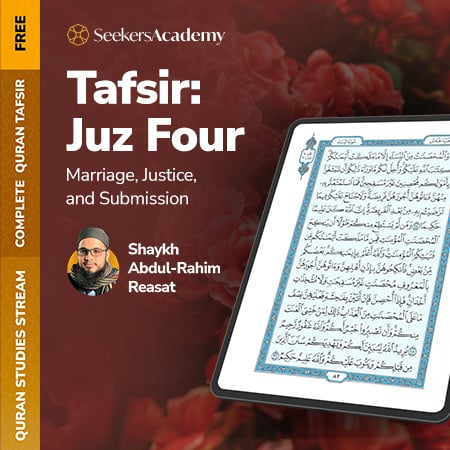
This course concludes the discussion on the latter part of Sura Al ‘Imran, where the attempts of the People of the Book to avoid submission to God are criticised. Next, the Believers are told how to benefit from their belief in Tawhid: though unity amongst themselves, service and benefit of humanity, and devotion to God. Devotion comes from certainty in Allah’s plan and guidance. Ignoring that guidance leads to failure. These lessons are highlighted through the events of the battles at Badr and Uhud, ending with a summary of what devoted servants of God are like.
Next, Sura al-Nisa (Women), also known as the Chapter of Justice, begins to redress the wrongs present in Arabian and other societies: the mistreatment of the weak. Orphans, inheritance, and who one may marry are the first matters to be addressed.
This tafsir is primarily based on a classical and a contemporary work:
‘‘Tafsir Abi al-Su’ud,” by Shaykh al Islam Abu al-Su’ud al ‘Imadi, the great Ottoman Judge, Mufti, and Mufassir. This work is authoritative in the science of tafsir. It was built upon the greatest tasfirs that came before it and had an undeniably strong influence on those which came after it.
• “Al-Tafsir al-Wasit,” by Shaykh al Azhar, Muhammad Sayyid Tanwati, the Grand Mufti of Egypt. This tafsir was written over ten years and is based on some of the most influential works in this science, including the tafsirs of Tabari, Qurtubi, Ibn Kathir, and Alusi. It summarises many of the nuanced and detailed discussions found in other works.
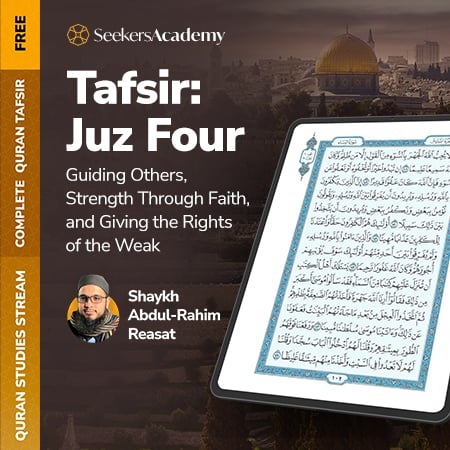
This tafsir is primarily based on a classical and a contemporary work:
• ‘‘Tafsir Abi al-Su’ud,” by Shaykh al Islam Abu al-Su’ud al ‘Imadi, the great Ottoman Judge, Mufti, and Mufassir. This work is authoritative in the science of tafsir. It was built upon the greatest tasfirs that came before it and had an undeniably strong influence on those which came after it.
• “Al-Tafsir al-Wasit,” by Shaykh al Azhar, Muhammad Sayyid Tanwati, the Grand Mufti of Egypt. This tafsir was written over ten years and is based on some of the most influential works in this science, including the tafsirs of Tabari, Qurtubi, Ibn Kathir, and Alusi. It summarises many of the nuanced and detailed discussions found in other works.